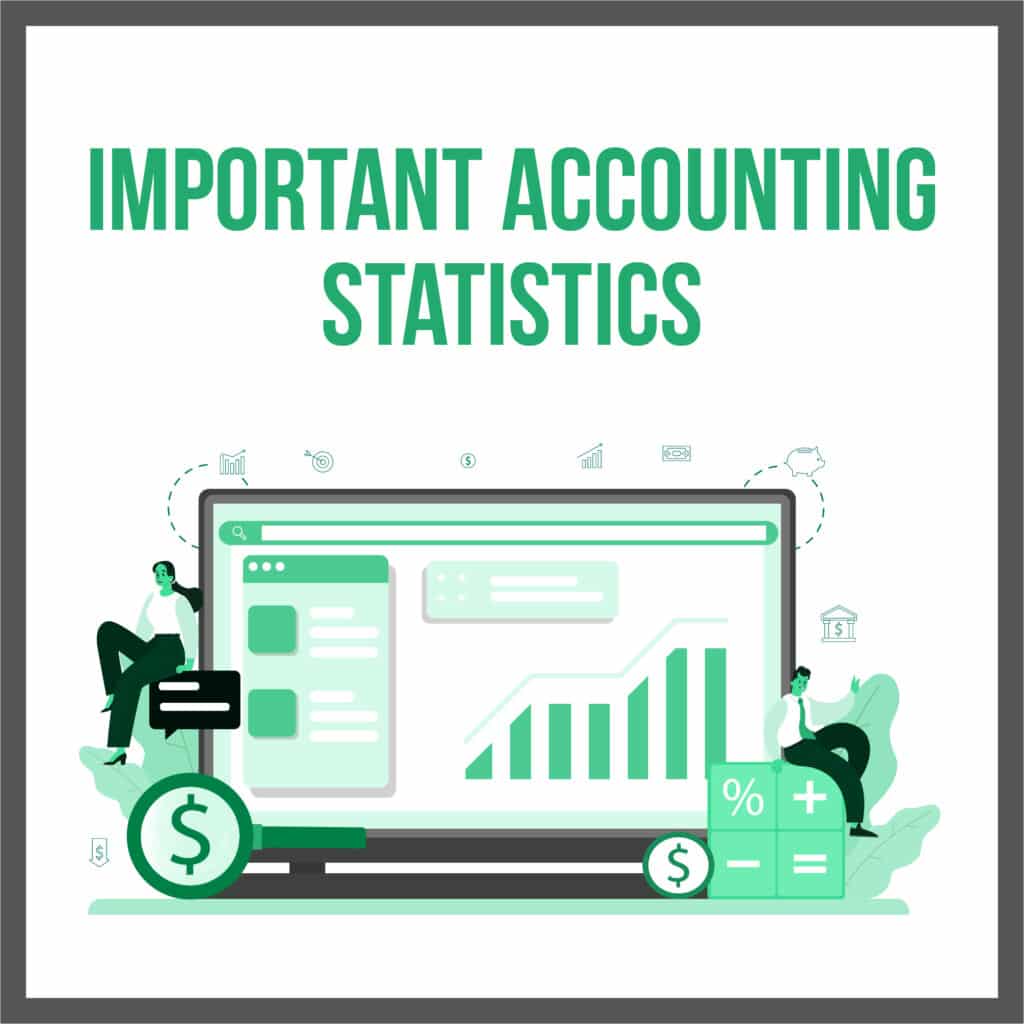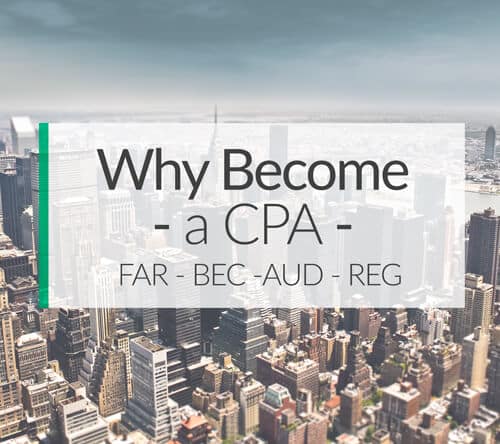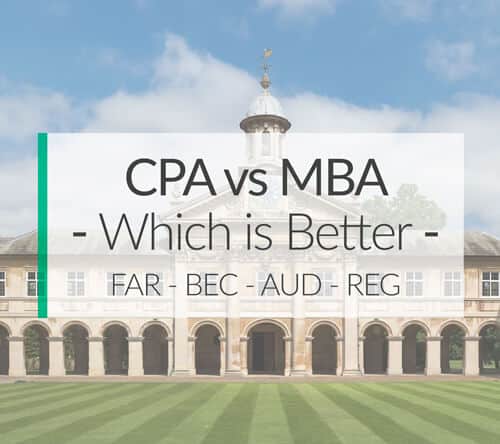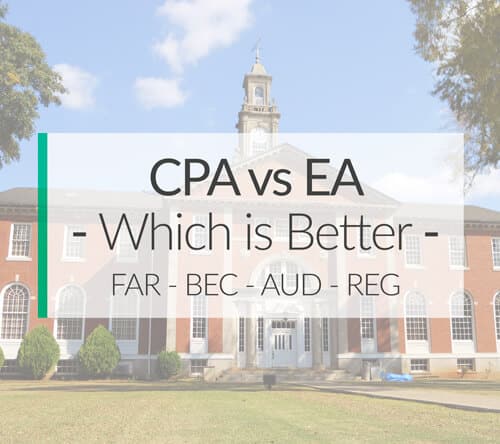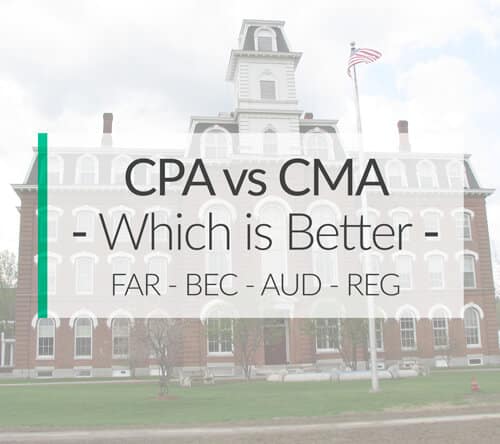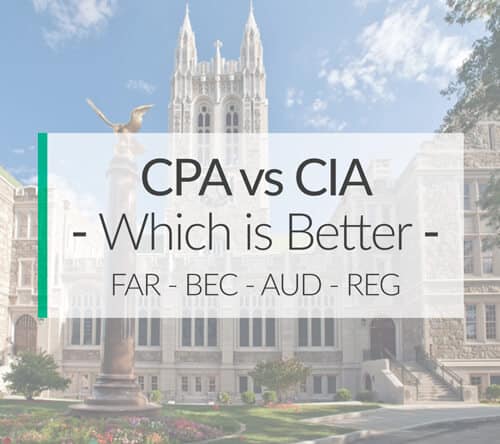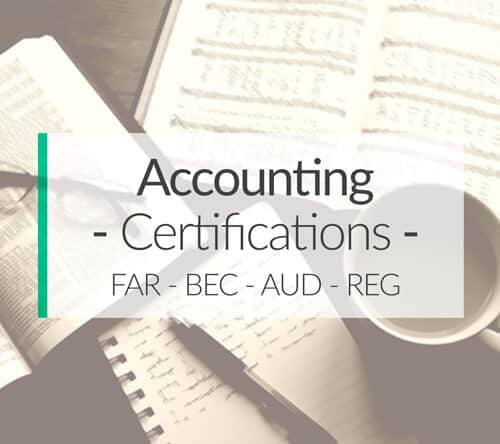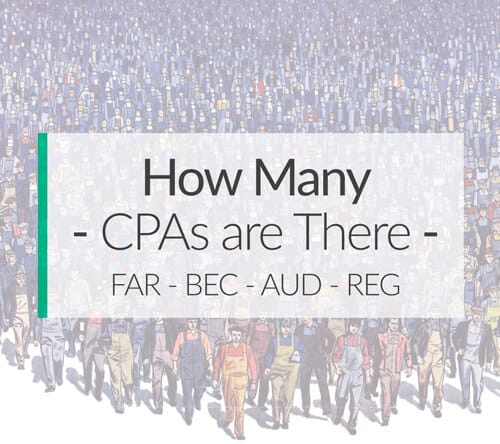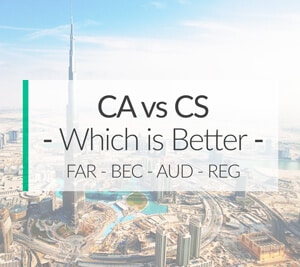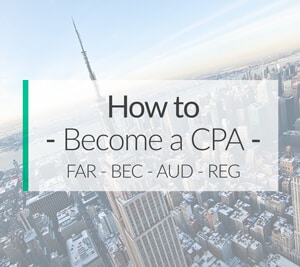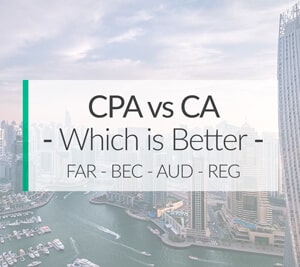
Both the Certified Public Accountant (CPA) and Chartered Accountant (CA) are credentials that you earn through defined study and by passing an examination. The CPA credential is issued solely in the U.S. whereas the CA credential is administered and recognized worldwide.
CPAs are regulated in the U.S. on the state level whereas CAs are regulated by individual country. But which one is better? Check out our comparison below of CPA vs CA certification!
- 1.Becker CPA Review Course: Rated the #1 Best CPA Review Course of 2024
- 2.Surgent CPA Prep Course: Best Technology
- 3.Gleim CPA Review Course: Largest Question Bank
What is the difference between a CPA and CA?
What is a CPA?
A certified public accountant is a professional who has passed the CPA examination administered by the American Institute of Certified Public Accountants (AICPA) and fulfilled all of the education and work experience requirements associated with taking the exam. These professionals are experts in US GAAP, US federal income tax, and several other areas of US accounting and financial law such as auditing. Although this certification is respected around the world, it’s a US designation certifying that the professional is competent in US accounting and able to perform auditing and taxation tasks that other professionals are not allowed to do.
What is a Chartered Accountant?
A charted accountant is a professional who has passed the CA exam and the required education in his or her country of certification. There are many organizations that provide education and examination for CAs. A few examples include the Institute of Chartered Accountants of Scotland (ICAS), the Institute of Chartered Accountants in England and Wales (ICAEW), Institute of Chartered Accountants of India (ICAI) and the Canadian Institute of Chartered Accountants (CICA.) Chartered Accountants in Canada, Australia, New Zealand, Mexico, and Ireland have a reciprocity agreement with the United States. If they can pass an equivalency exam, they can work in the U.S. as CPAs. CAs are experts in IFRS and other international accounting standards. Though they may have a good grasp on US GAAP, they aren’t as trained in this area as CPAs are.
CPA vs CA Career Path Differences
As far as knowledge base and responsibilities are concerned, there is very little difference. Both CPAs and CAs focus on providing financial services for clients – either personal, small business or large corporations. Areas of study and expertise include auditing, taxation, financial reporting, and business/managerial accounting. Both types of accountants can work in the public and private sectors.
If you are a CPA or CA, you can find employment in the government, industry, major public accounting firms or (in increasingly rare circumstances) as solo practitioners.
Chartered accountants typically work outside the United States, while CPAs drastically outnumber CAs in the United States’ workforce. If you want to work in the US, you will most likely want to become a CPA.
Get Discounts On CPA Review Courses!

Take $1,200 Off Surgent CPA Ultimate Pass
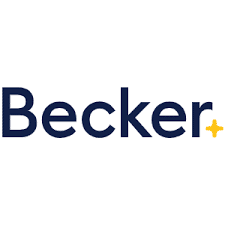
Get $1,140 Off Becker CPA Pro

Take $1,110 Off Surgent CPA Ultimate Pass

Get $1,000 Off Becker CPA Concierge

Enjoy $1,000 Off Gleim CPA Premium Pro

Becker CPA: 0% Interest Payment Plan

Becker CPA Advantage Package Now $2,499 – Promo

Get CPA Evolution Ready Content on All Becker CPA Courses

Take $1,500 Off Surgent CPA Ultimate Pass

Sale – Becker CPA Premium Package Now $3,099

Enjoy a 14-day Free Trial on Becker CPA Courses

Save on Becker CPA Single Part Courses
CPA vs CA Time Requirement Differences
It takes a considerable amount of time to become either a CPA or CA. It’s a little more straightforward for the CPA requirements. You must have completed 150 undergraduate credit hours and some states require that you must also have worked a given number of hours under the direct supervision of a CPA. You then have 18 months to sit for and pass all four parts of the CPA exam. So, it could take about 8 1/2 years to become a CPA (e.g. five years of undergraduate work, two years on the job and 18 months to pass the CPA exam).
How long it takes to become a CA depends on what country you plan to practice in and your level of education and professional experience. As an example, the ICAS has four options:
1) Direct entry route for school-leavers, which requires five years of training with an ICAS-approved employer;
2) Graduate entry route for university graduates, which requires three years of training with an ICAS-approved employer;
3) Professional entry route for experienced finance professionals is for established professionals with a university degree (formally recognized as a UK equivalent) or five years of relevant work experience and
4) The pathways route that allows members of The Chartered Institute of Public Finance and Accountancy (CIPFA) the opportunity to become a member of ICAS and earn CA designation.
There are two pathways; one measures relevant expertise and the other, practical competence. Both pathways require seven years of post-qualification experience.
The best “apples-to-apples” comparison would be CPA = ICAS Pathway #2.
CPA vs CA Cost of Certification
How much it costs to get your CPA license is variable. All states require that you earn a minimum of a bachelor’s degree in accounting or business with including a number of required courses. Almost all states require that you earn at least 150 credit hours as well. Thus, your CPA educational requires will vary depending on if you pursue a master’s degree to earn your last 25 college credit hours or simply take more classes in your undergraduate degree program.
The certification process itself will cost about $3,000 including a proper CPA review course and exam fees. After you pass the exam, you will also need to keep your license valid with continuing education credits each year. These vary in price but most cost between $50-$100 per credit hour. Most states require around 40 credits per year. Don’t worry though. If you get a job at a public accounting firm, they will pay for your continuing ed. 🙂
The cost for becoming a CA depends on the country you live in, your education and work experience and what organization you are applying to for obtaining your credential. For example, if you are applying to ICAS and you choose Pathways #1 and #2 (direct entry from school or university) then your employer will cover the costs. If you opt for Pathway #3 (Experienced Professional), the costs are roughly £5,750 – £13,900. Pathway #4 (for CIPFA members) costs are £1,035 for the Relevant Expertise Pathway. For the Practical Competence Pathway, the costs are: £596 for the training contract; £1,547 – £1,935 for class fees; £292 for the exam fee and £495 for annual ICAS/CIPFA membership dues. If there are continuing education and licensing requirements, they will be determined by the country in which you are working.
CPA vs CA Salaries
Salaries for both CPAs and CAs depend on your geographic location, job title, and years of experience. Thus, they vary drastically.
The median salary for a CPA in the U.S. is $62,410 and the median salary for a CA in the U.K. is £34,637 ($44,849 USD). Both certifications have large salary upward mobility and can each make $150,000 or more each year depending on the position and level of experience.
CPA vs CA: Why not have Both?
There’s really no reason to get both of these certifications since they are so similar. You are better off choosing one or the other. Unless you plan to practice both in the U.S. and abroad there’s no need to have both credentials.
The general rule of thumb is if you are planning to work outside the United States for international companies that aren’t traded on US markets, you should probably look toward the Chartered Accountant certification. On the other hand, if you want to work in the US, for/on a US company, or a company that is traded on US markets, you will probably need your CPA.
Certified Public Accountant vs. Chartered Accountant – Which Certification is Better?
Neither one of these certifications is better than the other. They are simply different and used for different purposes. You can expect to make about the same salary with both credentials given that the location, job position, company, and work experience are the same. It really comes down to what you want to do and where you want to work.
If you want to work in IFRS and non-US GAAP markets, you should go with a CA designation. If you want to work in US GAAP, you will most likely be required to get your CPA license.


